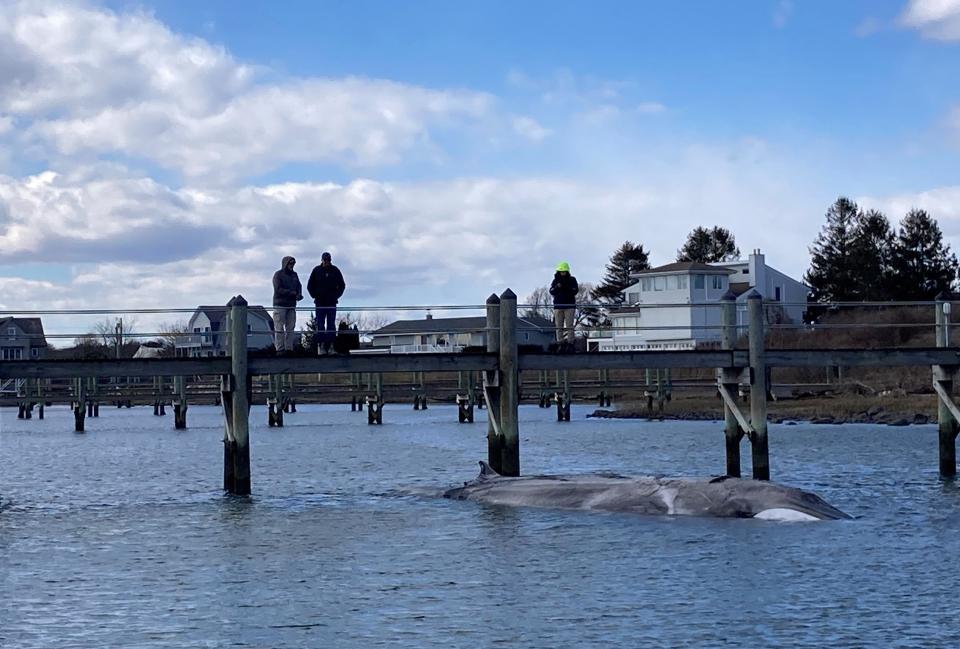Fin whale that stranded in Potter Pond dies. Here's what happens now
The juvenile fin whale that stranded in Potter Pond in South Kingstown on Thursday has died.
"These cases are always heartbreaking, seeing such a beautiful animal in a compromised state. As sad as the outcome is here, I feel some relief that this animal is now at peace," said Sarah Callan, animal rescue program manager for Mystic Aquarium, who responded to the call, in a news release. "We’ll collect a lot of data today and not only learn more about what happened with this specific whale, but also different threats that this species faces as a whole."
The whale was reported to Mystic Aquarium's Animal Rescue hotline by a local resident at 6:30 a.m. on Thursday. Emaciated but with no other sign of physical injury, the 42-foot whale likely was so weak that it floated in with the tide, according to Callan. The hope was the during the noon high tide the whale would be able to free itself, but that didn’t happen.
In consultation with NOAA, the Rhode Island Department of Environmental Management and other partners, a decision was made to use medical intervention to reduce the whale's suffering. At 9:20 p.m. the whale died with Mystic Aquarium and RI DEM personnel on the scene, according to the aquarium.
Why couldn't the whale be towed back out to sea?

Ahead of the whale's death, there was a steady stream of people braving the winter wind to stand on a nearby dock to see the rather rare sight. Fin whales are much more common in deep waters, such as off of Cape Cod, than near Rhode Island.
Watching the rescue effort, people tried to help in the ways that they could.
“The nearby homeowners were bringing us coffee yesterday and we were getting emails with prayers for the whale. The community rallied to keep our spirits up, and we’re just really grateful,” Francesa Battaglia, animal rescue technician, said in the release.
But overall, it was tough to watch.
“It’s sad,” said Jim Martin, who came with his wife, Marcie, a wildlife photographer. “It’s strange how he got in the shallow.”
Even over the whip of the wind, people could hear the whale’s breathing. And as each new person came by, almost all had the same question: why couldn’t the whale be moved?
With the whale weighing about 25,000 pounds, Callan said trying to tow the whale back out to sea is too dangerous.
“You can paralyze them by doing that," Callan said. "Their body is so heavy that if you pull them by the fluke, the spine will break. Unfortunately, there is not an easy way to move an animal of this size.”
And even if it was towed back out to sea, Callan said given the weakened condition it was likely to restrand somewhere else.
What is happening with the whale's carcass?
Now that the whale has passed, the Mystic Aquarium Animal Rescue team will work with NOAA and other network partners on a necropsy to learn more about the potential causes of this stranding.
The animal was towed to a nearby beach for a necropsy by boat, with an excavator to help move the whale to shore, according to Meagan Seacor, Mystic Aquairum's vice president of external relations. A team of 20 people conducted the necropsy on Friday.
Fact check: No evidence offshore wind projects are killing whales on East Coast
"The findings from the necropsy and pathology will help determine the cause of death," Seacor said. "After the necropsy, the remains will be transported to a different predetermined location for burial and natural decomposition."
A second whale washed up on Moonstone Beach
Also on Thursday, a pilot whale was found on Moonstone Beach. Unlike the other whale, this one died in the ocean and washed in with the most recent storm, according to Seacor.
"We sent our team out to review yesterday and collect data on the animal, but due to the decomposition, we will not be able to conduct a necropsy," she said.
How to report a marine animal stranding in Rhode Island
Since 1975, Mystic Aquarium has led animal rescue efforts along 1,000 miles of shoreline covering Rhode Island, Connecticut and Fishers Island, New York, as part of the Greater Atlantic Region Stranding network.
If you see a stranded or dead marine animal or sea turtle, call Mystic Aquarium's 24-hour hotline at (860) 572-5955, ext. 107, and expect a return call. Keep at least 150 feet away from the animal, even if it's dead, and do not attempt to touch or feed it.
This article originally appeared on The Providence Journal: Fin whale that stranded in South Kingstown dies, Mystic Aquarium says

